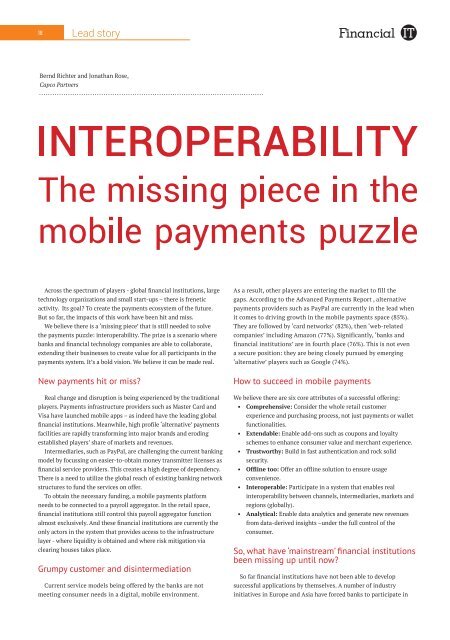Special Sibos 2014 Edition
Any change that can promote the expansion of the global economy is change for the good. Taking into account common sense, economic theory and, indeed, the very raison d’être of the World Trade Organization (WTO), such change would include a move towards freer trade in goods and services between nations. Freer trade is promoted when the costs and risks – to all parties involved - are reduced.This is a central theme of this edition of Financial IT. Many of the contributed articles focus on the technology and infrastructure governing payments – especially between corporates. Many of the articles also examine questions of trade finance. Both topics are closely linked. Innovation – whether it comes from financial IT providers, the banks or other actors – that facilitates payments between trading companies will usually make it easier to finance trade.
Any change that can promote the expansion of the global economy is change for the good. Taking into account common sense, economic theory and, indeed, the very raison d’être of the World Trade Organization (WTO), such change would include a move towards freer trade in goods and services between nations. Freer trade is promoted when the costs and risks – to all parties involved - are reduced.This is a central theme of this edition of Financial IT. Many of the contributed articles focus on the technology and infrastructure governing payments – especially between corporates. Many of the articles also examine questions of trade finance. Both topics are closely linked. Innovation – whether it comes from financial IT providers, the banks or other actors – that facilitates payments between trading companies will usually make it easier to finance trade.
You also want an ePaper? Increase the reach of your titles
YUMPU automatically turns print PDFs into web optimized ePapers that Google loves.
18<br />
Lead story<br />
Bernd Richter and Jonathan Rose,<br />
Capco Partners<br />
Across the spectrum of players - global financial institutions, large<br />
technology organizations and small start-ups – there is frenetic<br />
activity. Its goal? To create the payments ecosystem of the future.<br />
But so far, the impacts of this work have been hit and miss.<br />
We believe there is a ‘missing piece’ that is still needed to solve<br />
the payments puzzle: interoperability. The prize is a scenario where<br />
banks and financial technology companies are able to collaborate,<br />
extending their businesses to create value for all participants in the<br />
payments system. It’s a bold vision. We believe it can be made real.<br />
New payments hit or miss?<br />
Real change and disruption is being experienced by the traditional<br />
players. Payments infrastructure providers such as Master Card and<br />
Visa have launched mobile apps – as indeed have the leading global<br />
financial institutions. Meanwhile, high profile ‘alternative’ payments<br />
facilities are rapidly transforming into major brands and eroding<br />
established players’ share of markets and revenues.<br />
Intermediaries, such as PayPal, are challenging the current banking<br />
model by focussing on easier-to-obtain money transmitter licenses as<br />
financial service providers. This creates a high degree of dependency.<br />
There is a need to utilize the global reach of existing banking network<br />
structures to fund the services on offer.<br />
To obtain the necessary funding, a mobile payments platform<br />
needs to be connected to a payroll aggregator. In the retail space,<br />
financial institutions still control this payroll aggregator function<br />
almost exclusively. And these financial institutions are currently the<br />
only actors in the system that provides access to the infrastructure<br />
layer - where liquidity is obtained and where risk mitigation via<br />
clearing houses takes place.<br />
Grumpy customer and disintermediation<br />
Current service models being offered by the banks are not<br />
meeting consumer needs in a digital, mobile environment.<br />
As a result, other players are entering the market to fill the<br />
gaps. According to the Advanced Payments Report , alternative<br />
payments providers such as PayPal are currently in the lead when<br />
it comes to driving growth in the mobile payments space (85%).<br />
They are followed by ‘card networks’ (82%), then ‘web-related<br />
companies’ including Amazon (77%). Significantly, ‘banks and<br />
financial institutions’ are in fourth place (76%). This is not even<br />
a secure position: they are being closely pursued by emerging<br />
‘alternative’ players such as Google (74%).<br />
How to succeed in mobile payments<br />
We believe there are six core attributes of a successful offering:<br />
• Comprehensive: Consider the whole retail customer<br />
experience and purchasing process, not just payments or wallet<br />
functionalities.<br />
• Extendable: Enable add-ons such as coupons and loyalty<br />
schemes to enhance consumer value and merchant experience.<br />
• Trustworthy: Build in fast authentication and rock solid<br />
security.<br />
• Offline too: Offer an offline solution to ensure usage<br />
convenience.<br />
• Interoperable: Participate in a system that enables real<br />
interoperability between channels, intermediaries, markets and<br />
regions (globally).<br />
• Analytical: Enable data analytics and generate new revenues<br />
from data-derived insights –under the full control of the<br />
consumer.<br />
So, what have ‘mainstream’ financial institutions<br />
been missing up until now?<br />
So far financial institutions have not been able to develop<br />
successful applications by themselves. A number of industry<br />
initiatives in Europe and Asia have forced banks to participate in


